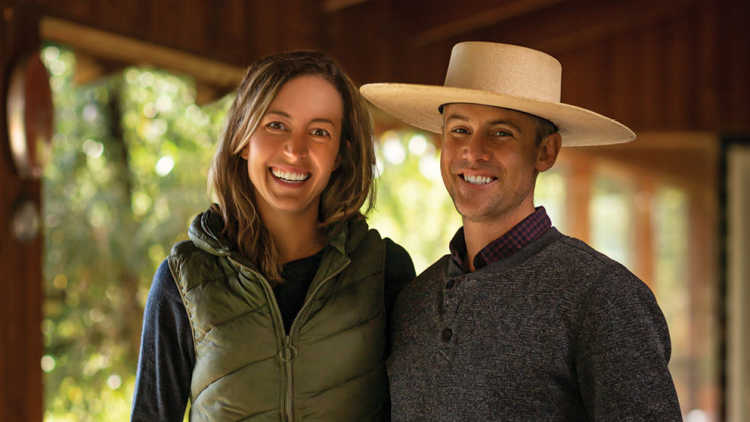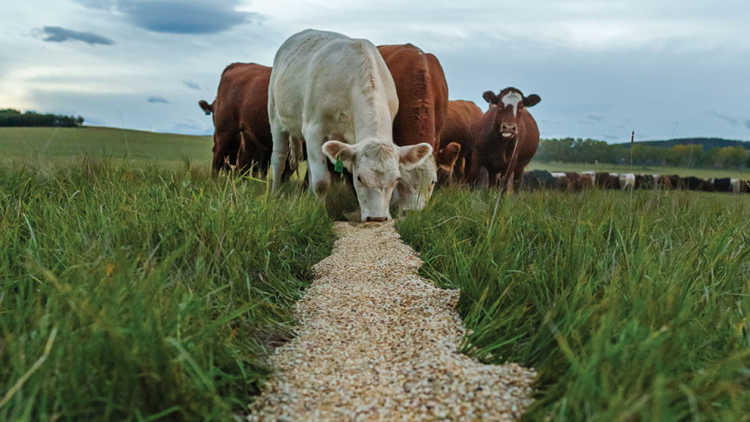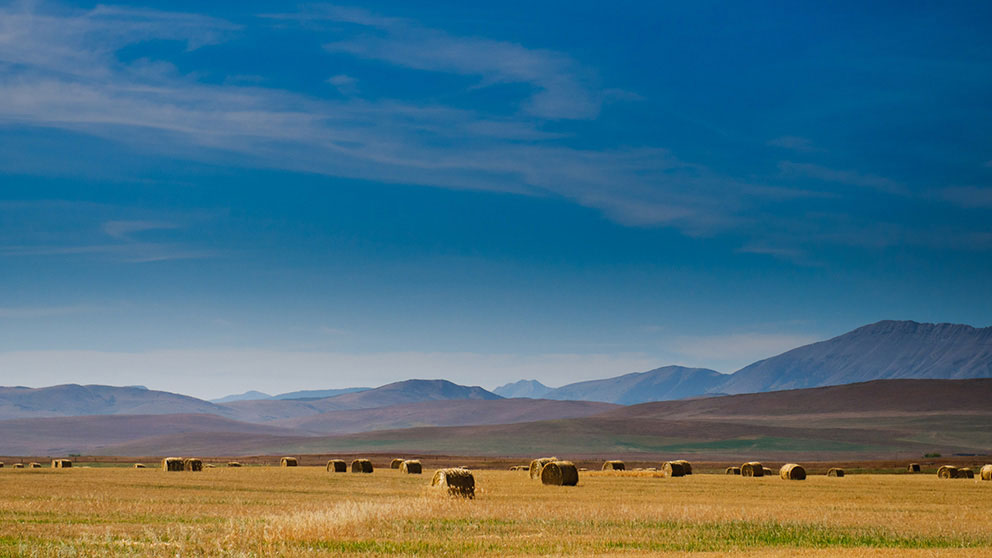Growing from boots-on-the-ground manager to CEO mindset

Though the ranchland he now owns has been in the family since the 1950s, Ben Campbell didn’t inherit an abundance of agricultural expertise. Far from it. “I didn’t really know anything about anything to do with agriculture,” he says.
Trained as an engineer and in a career that didn’t feel right for him, he got the urge to buy a few yearlings and test out the industry, and everything aligned. Everything except his own knowledge base.
“One of the first things I got was Raising Beef Cattle for Dummies,” he recounts with a laugh. And that was only the beginning. “I [read] everything I could find about rotational grazing, winter feeding, water systems, fencing systems, cattle ailments, breeding – that’s the thing about the beef sector, there are just so many things you can learn.”
Ben attended conferences across Canada, took courses in Idaho and South Dakota, and when he realized he needed a local support network, well, he just started cold-calling ranchers nearby.
Given his enthusiasm, it’s not surprising that today Grazed Right, the ranch he runs alongside his wife Stephanie outside Calgary, is a bustling enterprise and a fresh take on how modern farm management can work for a young family with big plans.
"We know what we value, we talk about it as a family, and we know that this farm works for us – not the other way around.”
Ben rented family land until he was able to purchase 320 acres of it. He now rents a portion more, giving him about 1,400 acres and an assortment of infrastructure – only some of which he has needed. This year, the farm boasts roughly 270 yearlings, 30 grass-fed cows for direct marketing, 10 pigs and a handful of chickens. He also boards horses and rents out portions of his unused farm buildings, but next year could be a different story.
“Every year I do an analysis on all the different ways I make money, and I create two numbers,” Ben explains: return on investment and dollars-per-hour wage for his own labour. “If anything stands out that isn’t making a lot of money, or if they are all making money but I’m too busy and I need to cut something, I know what needs to be cut.”
Unsurprisingly, Ben’s a big fan of spreadsheets, and he’s also aware of their limitations: “Another thing that doesn’t have a number value but is as important is that I enjoy certain things more than others,” he explains.
“This farm works for me, I don’t work for the farm,” he says.
Diversifying into higher-value products is a big part of the future of the ranch. “My kids are little,” Ben says, “but I hope that some of them will want to work on the ranch someday. [Diversifying] is one way that even though we’re small, we’ll eventually be able to support more than one family.”
Ben’s engineering degree helps him keep an eye on all the moving parts. “You take a complex system and break it down into components and analyze and adjust the components before putting it back together to see how it works,” he says. “That sort of critical thinking has been crucial to managing and figuring out how to run a successful business.”
As a relative newcomer to the industry, Ben is already overcoming a common predicament for many: how to manage the day-to-day while keeping the long-view vision for the farm in focus. He’s got the passion, grit and ambition to succeed and he’s also exhibiting more than a few traits of the boardroom CEO, albeit against a more pastoral setting.
Traits of the CEO that work beyond the boardroom and into the farmyard
Foresight: set the vision, stay the course
Grazed Right has three main goals: “It has to provide something valuable to the community, it has to be good to the environment, and it has to be something my family enjoys.”
His strategy is ever-evolving while he keeps those goalposts in sight. Sticking to his clearly defined mission statement, he can test out the theory behind new ideas without having to learn the hard way how veering off-course might affect the potential of his business.
“I can use that to say, well, grain prices are through the roof, why don’t I rip up all my pasture and all my rental land and start doing canola? But that doesn’t satisfy those [main goals], so that’s not an option,” he explains.
Engaging for impact: invest in your ability to adapt
Investment doesn’t only mean putting down dollars and cents. “I’m a very passionate person, so once I get interested in something that’s the only thing I think about,” Ben says. “I’m definitely a life-long learner.” You can make training and development cornerstones for your farm business.
His approach to investigating new possibilities isn’t one-sided. While he’s studying up on everything he can ahead of time, he’s also keeping meticulous track of all his real-time endeavours.
“I now have economic forecasts for the whole ranch broken down by enterprise,” he says. That’s the behind-the-scenes work that gives him the confidence to consistently take calculated risks. The very sort his business is built on.
“Because I don’t have a bred cow herd, I have to decide what I’m going to sell next year … and what weight I’m going to buy them at,” he explains.
Every year brings new decisions and Ben must have the confidence — innate, inherited, or in his case, reinforced by data — to make the leap.
Thinking outside the box: choose your own adventure, wisely
At the end of 2021’s hot, dry summer, Ben contemplated what to do about a store of feed he bought when prices were good. With his yearlings sold, he no longer needs it.
“The bred cow market is probably going to be slow because of the high cost of feed due to the drought,” he says. “I’m going to do an analysis of it: should I buy bred cows, or should I sell the feed? Should I buy yearlings, but buy them later in the year? Maybe I should just sell the bales? Maybe I can’t afford to keep them and feed them to my own cattle.”

Even with all the proper calculations, it may be that the market shifts and the opportunities change – Ben can’t pretend to have the right answer all the time. While he doesn’t have a crystal ball, he does have natural curiosity, the courage to take chances, and a commitment to the future of the business he’s building.
Looking forward…
Grazed Right is truly a family business. This year, Stephanie is taking over the pigs and hens, Ben is focusing on the cattle, and while the kids are too little to help just yet, they are clearly a big part of the picture. Family life is something that can’t be ignored when charting a course for the business.
“I can’t just put my head in the sand and say I’m going to power through this, I have to work,” Campbell says. “We know what we value, we talk about it as a family, and we know that this farm works for us – not the other way around.”
Ben talks about his approaches and journey in Episode 4: Ranching by the Numbers of the Talking Farm & Food podcast.
Key business management tips from Grazed Right
Write a mission statement that sets your vision.
Develop a business plan to guide decisions.
Calculate detailed production costs and know your return on investment.
Perform economic forecasts, broken down by enterprise.
Make decisions based on intuition and experience – and also on data.
Improve efficiency wherever possible. Every small improvement boosts overall profitability.
Implement opportunities to diversify if your business plan supports it.
Think beyond transition. The Campbells are aiming for a business that allows for multi-family support down the road.
Take risks only after you’ve calculated the projected costs and benefits.
Keep detailed records. Farm business management software like AgExpert can help.
From an AgriSuccess article by Emily Leeson.

Understand the different paths, and rules and regulations when purchasing land as a First Nation.
